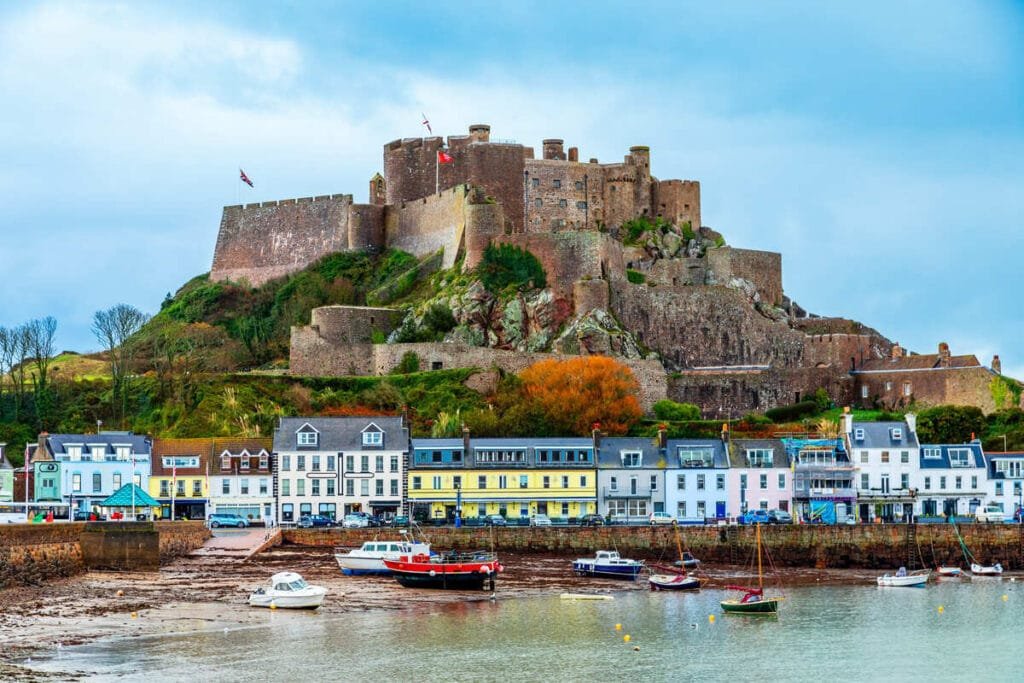Travel Guide
These 5 Idyllic European Islands Offer Medieval Sights And A Cooler Summer Experience
Last Updated
With temperatures rising dangerously across much of Europe this summer, reaching an unpleasant 100°F and higher in parts of Spain and Greece, demand for more Northerly destinations, where the heat isn’t as oppressive, keeps mounting.
Previously ignored by sunseekers, Scandinavia, the Baltics and the British Isles are all rising as alternatives to the sun-scorched Mediterranean, as the weather is generally much more temperate, crowds are smaller, and the tourism offer is just as great.
One of these cooler summer spots, the Channel Islands have unspoiled sandy beaches, medieval landmarks, and a fascinating history certain to appease the odd culture buff:


What (And Where) Are The Channel Islands?
Located in the English Channel just off the coast of Normandy (that’s Northern France, if geography isn’t your forte), these 5 sleepy islands are formally administered by Great Britain, though they are not technically part of that country.
They’re officially dependencies of the British Crown, meaning they’re autonomous, with independent institutions and governing bodies, but for all purposes internationally, they remain a British territory; technicalities aside, they’re one of Europe’s least-known island destinations.


The Channel Islands are divided into two groups: the Bailiwick of Jersey, corresponding to Jersey, the largest of the islands, and the Bailiwick of Guernsey, comprising Guernsey, the second-largest island, and the much-smaller Alderney, Sark and Herm.
Jersey is home to over 103,000 residents, while Guernsey’s population stands at roughly 64,000, followed by Alderney (2,167), Sark (562) and Herm (60)––whether you’re looking for a lively island getaway or some peace and quiet, you know where to go.
France Or Britain? How About Both?


Though they’re subjects to the British crown and hold U.K. passports, Channel Islanders are just as culturally attached to Normandy due to their History and geographical proximity––Jersey is only 14 miles off the coast of France versus 85 miles for England––and that incredible duality shows:
Whether it’s the cuisine, typically Norman in character, or the local languages, the Channel Islands almost seem too French to be formally British, yet too British to be French––if the sneaky Union Jack flying atop historic forts and the odd red telephone box are any indication.


In Saint Helier, for instance, the capital of Jersey, street names come in both English and French forms, and all around the island, you can hear hints of Jèrriais, the French-influenced local dialect; the same goes for Guernsey, where the marginal Guernésiais is occasionally spoken.
Needless to say, most locals are perfectly conversational in both English and French, so tourists are able to get around just fine without having to resort to Google Translate, but these islands’ Franco-British character is far from being the biggest draw for tourists:
Undisturbed Beaches


When you think of European islands, their crystal-clear seas and picturesque towns left virtually untouched amid the 20th-century development boom, you’re likely to picture Croatia, Greece, Italy and their Mediterranean counterparts.
It turns out you don’t need to splurge on an all-inclusive getaway to Crete to experience an idyllic European summer: the Channel Islands are just as extraordinarily charming, with scenic coastal views and sandy beaches that run along the most serene, bluest of waters.


Plémont Beach in Jersey is one of such coastal paradises, and an undisturbed cove flanked by small cliffs that locals flock into during summer to swim in natural rock pools, while St Brelade’s Bay is reserved for beachside strolls, basking in the Norman sun and casual dinners.
The pebbly Fermain Bay in neighboring Guernsey, a short drive from St Martin’s, is just as picturesque, accessible only via a cliffside footpath, and in Cabo Bay, near Castel, the powdered-sugar white sands and teal tone of the ocean has drawn comparisons to the Caribbean.
Milder Summer Weather


As the Channel Islands are not Southern European, the summer climate is much milder.
It averages a cozy 68°F in the balmy months, with occasional peaks of 82°F on particularly warm days (in sum, it is as warm in summer as Northern France is).
You should be able to walk around in shorts without chattering teeth during the day, and there’s plenty of sunshine between July and August, but we’d advise you to bring long-sleeve items for an eventual chillier evening when temperatures might drop as low as 53.6°F.


Additionally, don’t go thinking waters off the Channel Islands are Mediterranean warm: they may be crystalline and inviting, but this is the North Atlantic, after all, where sea temperatures are much colder, even in very hot days, so keep that in mind before you jump right in.
Fairytale Medieval Castles
On the culture front, Jersey’s top attractions include Mont Orgueil, a well-preserved medieval fortification hugged by the English Channel, the underground World War II tunnels dating back to the period of German occupation, and the 15-acre Elizabeth Castle.


In Guernsey, the 800-year-old Castle Cornet is the most iconic sight, perched on a rugged islet just off the coast, reached only by ferry, while the mainland is host to the Little Chapel, built from pieces of broken pottery, and a number of wartime ruins, including military headquarters and a German hospital.
As for the smaller islands of Alderney, Sark and Herm, part of the Bailiwick of Guernsey, they’re best known for their walking paths lapping around pristine coasts, quaint fishing villages where local accents grow ever stronger the more isolated they are, and thriving marine life.


Where To Stay In The Channel Islands
The best places to stay in the Channel Islands for tourist-friendly services and a big choice of hotels and guesthouses are the Jersey and Guernsey capitals:
In Saint Helier (Jersey), top hotel picks include Hotel De Normandie, with room rates starting from $217, or $108 per adult, and the beachfront Norfolk Hotel, with an outdoor swimming pool and breakfast included for $203, or $101.50 individually.


In St Peter Port (Guernsey), the Best Western Hotel de Havalet is a popular four-star listing that will set you back $227 per night, though if you’re looking to get the best bang for your buck, we can suggest the privately-managed Longfrie Inn, just outside town.
In the smaller islands, accommodation options are more limited and thus more expensive, and unless you’re actively looking for remoteness, we wouldn’t recommend them as a base for exploring the Channel Islands.


That being said, Alderney has a couple of well-equipped hotels in La Ville Hotel and the Blonde Hedgehog, with prices ranging between $291 and $319; on the other hand, there are no known permanent listings in either Sark or Herm on Booking.com.
How Hard Is It To Reach The Channel Islands?
The Channel Islands are easily reached by ferry from either England or France, and particularly the latter, due to their geographical proximity.
Ferrying To The Channel Islands
Available from:
- St Malo (France)
- Portsmouth (United Kingdom)
- Poole (United Kingdom)


Condor ferries depart daily from St Malo (France) to St Helier (Jersey) with tickets for foot passengers starting from $50, with a crossing time of 1h21, while Britain-originating ferries will typically set sail from Portsmouth or Poole, stopping at Guernsey before traveling onward to Jersey.
That’s a longer journey, with the Portsmouth-Guernsey ferry taking 7 hours to reach St Peter Port and the Portsmouth-Jersey ferry blocking at a whopping 11h30; though it takes as long as a Transatlantic flight, tickets are still quite cheap, selling from $48 upwards.


The islands themselves are very well-connected by frequent ferry routes, and come rain come shine, you should be able to cross from Jersey to Guernsey and back with no major issues––on the other hand, the smaller islands can be trickier to get to when seas are very rough.
Flying To The Channel Islands
Unless crossing the tumultuous English Channel on a ferry is on your bucket list, however, we’d advise you to fly from the U.K. to the Channel Islands as it’s much quicker––some flights take as little as an hour––and just as cheap.


Jersey Airport hosts flights from three London airports, including Heathrow, Gatwick and Luton, plus Birmingham and Manchester, Edinburgh and Glasgow in Scotland, and even Dublin and Belfast in the isle of Ireland, and Dusseldorf in Germany.
Similarly, Guernsey Airport is served by flights from a host of U.K. and Irish airports, as well as French––you can fly nonstop to Guernsey from Paris-Charles de Gaulle and Grenoble––and a couple of Dutch hubs, Rotterdam/The Hague and Groningen.
↓ Elevate Your Travel↓
Sign Up Now For Travel Off Path Premium! No ads, VIP Content, Personal Travel Concierge, Huge Savings, Daily Deals, Members Forum & More!


✈️Join Our Travel Off Path Community Forum: Where travelers unite, ask questions, share experiences and even find like-minded travel buddies!
SUBSCRIBE TO OUR LATEST POSTS
Enter your email address to subscribe to Travel Off Path’s latest breaking travel news, straight to your inbox.
This article originally appeared on TravelOffPath.com
Opinions expressed here are the author’s alone, not those of any bank, credit card issuer, hotel, airline, or other entity. This content has not been reviewed, approved or otherwise endorsed by any of the entities included within the post.

